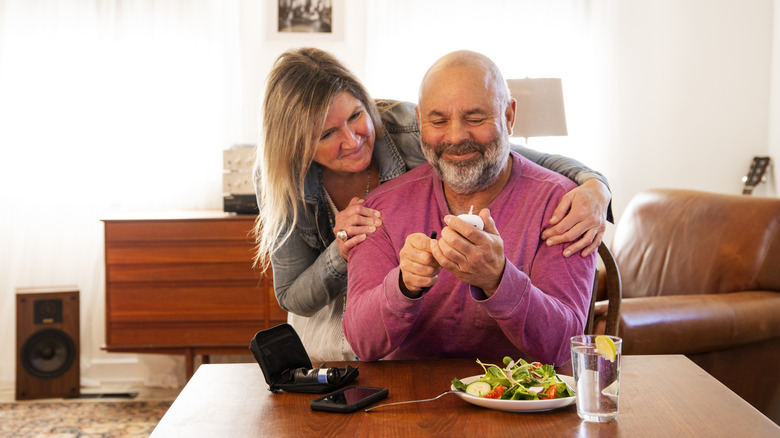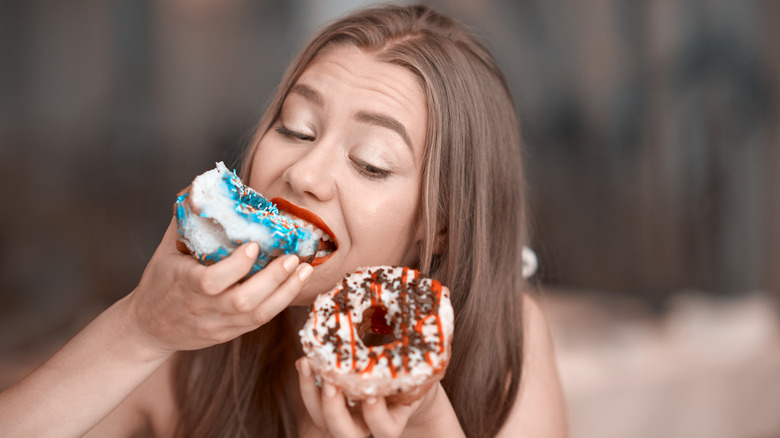What Happens To Your Body If You Eat When You're Not Hungry
It's hard to find someone who hasn't been guilty of sneaking in a snack or two, even if they weren't really hungry. From opening a bag of chips during a Netflix and chill marathon to grabbing a late-night slice of cake, mindless eating is a trap that we all can fall into on occasion. It's fairly common, according to a 2007 study published in Environment and Behavior. That study showed that people have a tendency to underestimate the food decisions they make by a factor of 200 or more.
There's no one reason why we eat when we're not hungry. The National Institutes of Health reports that environmental cues could be a factor, citing how people serve approximately 22% more pasta on a 12-inch plate than on a plate that's 2 inches smaller. In addition, convenience is another factor. When eating chicken wings, for example, the NIH noted that, if the bones are left on the table, people will eat 30 to 40% more than if the table is cleared. Having the cue that it's time to stop eating can be a big part of what keeps us eating, even when we're not really in the mood for food. Whatever the cause, however, it is clear that our bodies don't always appreciate being filled up when they're not ready. Here's what a mid-meal binge sesh can do to your body.
It can wreak havoc on your blood sugar
Eating when we're not hungry, stress eating, or emotional eating all have the power to send our blood sugar spinning out of control. A lot of times, when we eat without being hungry, we tend to reach for high-fat, high-salt, and overly processed foods. According to the Diabetes Care Community, this can lead to sharp spikes in blood sugar, followed by a subsequent crash that can affect one's mood. In addition, these blood sugar highs and lows can lead to a host of long-term issues, including kidney problems and heart disease.
The key to keeping your blood sugar levels under control could be tied to when you consume your calories. A 2023 study conducted by the Endocrine Society showed that people who consumed 80% of their calories before 1 p.m. experienced better regulation of their blood sugar levels than people with regular eating habits. While there is still some research to be done, the study posits that consuming calories earlier in the day may cut down on the need to snack when you're not hungry.
You can gain weight
Unsurprisingly, unconscious eating can lead to a calorie surplus. A 2013 study published in the American Journal of Clinical Nutrition revealed that distracted eating can lead you to eat more without you even realizing it. When you're eating an entire bag of chips while watching TV, for example, you may not be as focused on what you're eating and miss hunger cues that are telling you that you're full. The study went on to note that it takes the brain 20 minutes after you start eating to send signals to the body that you're full. If you're eating mindlessly, you may not pick up on that cue, only stopping when you realize the chip bag is empty.
Additionally, eating when you're not hungry or distracted by other tasks, such as watching TV or scrolling on your phone, can cause you to eat too fast or eat an entire meal without realizing what you ate or even if it tasted good (via Spatz Medical). You can also find yourself eating more based on whatever you're watching or doing. For example, if you're watching a football game and your team is down in the fourth quarter, the stress of the game may cause you to keep reaching for snacks or foraging in the kitchen in search of more food to help ease the pain.
Your digestive system can be affected
Strange as it may seem, the digestive process is mental as much as it is physical. According to Mindful Ways to Wellness, the minute you smell food, your body begins producing the enzymes and digestive juices it will need to eventually break it down. So, in order for you to digest your food properly, the brain itself needs to be in a relaxed state. The problem is that if you're eating on the run or mindlessly snacking while stressed or distracted, the brain is thrown off, halting the digestion process. When that happens, whatever we're eating sits in our stomach, leading to digestive discomfort.
Bingham and Women's Hospital notes that when we're eating without thinking, snacking mindlessly, or eating when we're not hungry, the digestive process is less effective by up to 40%. This decrease in effectiveness can result in gas and bloating, as well as bowel problems. When the body and brain aren't aligned while we're eating, the brain may not receive signals telling us that we're full, which can lead to us eating until we feel sick.
Your mood can change
Mindless eating can trigger a number of changes in the brain, causing our mood to fluctuate from high to low. For example, according to the Better Health Channel, binge eating can come with a variety of psychological side effects, including stress, anxiety, feelings of shame and guilt, and sadness. On the other hand, the Cleveland Clinic says that eating in excess can release dopamine in the brain, creating pleasurable sensations and leading us to eat more.
This connection between eating and dopamine was reinforced by a 2001 study published in the Lancet (via Scientific American), which showed that people who are obese have the same neurochemical deficiencies as people who are dependent on cocaine and alcohol. When we eat sugary, processed snack foods, we can experience that dopamine rush, which is often followed by a subsequent crash (via Aetna). The sugar that we're consuming is also a major trigger for inflammation and spurs the growth of the so-called "bad" bacteria in the gut.
You increase your risk of disease
Mindless eating can come with a wide array of risks, not the least of which is to your health. Given the high-calorie, high-sugar content of most of the foods we eat when snacking, consuming them excessively can lead to a number of health conditions (via HMS Desk). Additionally, eating when you're not hungry and mindless snacking can impact the absorption of nutrients into your body, putting an unnecessary strain on your digestive system.
When it comes to snacking, timing is also important. A 2023 study conducted by King's College in London showed that people who ate snacks after 9 p.m. saw a higher blood sugar spike than people who ate earlier. This spike in blood sugar can be traced to such health problems as heart disease and type 2 diabetes. Given the fact that, according to the study, snacking accounts for 20 to 25% of people's daily energy intake, it's important to make smart snacking choices.
It can affect your sleep
You might not think there's any harm in enjoying a pre-bedtime snack, perhaps grabbing that last slice of cold pizza or scooping out some ice cream before hitting the hay. However, a 2018 study conducted by the University of Arizona (via Science Daily) showed a link between junk food cravings and poor sleep quality. 60% of the people profiled said they were regular nighttime snackers, and of those, two-thirds reported that their subsequent lack of sleep led them to crave more junk food. Additionally, a 2012 study published in the International Journal of Eating Disorders reported that women who binge ate experienced such problems as poor sleep, difficulty falling asleep, and feeling sleepy during the day.
In addition to messing with your sleep patterns, eating before bed is throwing your body into chaos and disrupting its circadian rhythm (via Cleveland Clinic). Our bodies are more sensitive to insulin in the mornings in order to get us up and moving and ready to face the day. However, at night, our resistance to insulin is higher, meaning that the food we eat isn't used as fuel but instead stored as fat.
It can impact your nutrition
Much of what we eat when we're not hungry tends to be snack foods that are full of so-called "empty calories." According to Medical News Today, these empty calories come from sugars, fats, and processed oils. These additions are what make these snack foods taste good, but they offer little or no nutritional value. Consuming empty calories can prevent you from getting the proper vitamins, protein, and fiber that you require.
Because your body can't properly absorb the nutrients in these empty-calorie snack foods, they tend to be stored as fat, as shown by a 2014 study published in the New Zealand Medical Journal. The study also shows that these snack foods, which tend to be high in sugar, can activate the addiction pathways and the reward centers in our brain. As a result, we tend to crave these foods even more than we do healthy snacks.
You may keep eating
Sometimes, eating when you're not hungry is because of an emotional rather than physical need. This is known as emotional eating, and according to the American Psychological Association, almost 40% of people in the U.S. are guilty of it. Of the people who emotionally eat, almost half of them report doing it on a weekly basis or more. The Mayo Clinic notes that emotional eating is how we sometimes combat negative emotions, including boredom, stress, and sadness. However, because we aren't dealing with the emotions at hand, they inevitably come back, leading us to reach for the snacks all over again.
Your emotions aren't the only thing that are keeping you on the cycle of snacking. The Cleveland Clinic notes that the lack of proper nutrition, such as protein, fiber, and healthy fats in snack foods, means that, while your stomach may be filling up, your body isn't getting what it needs. So, while you may be temporarily satisfied, your body is still craving the proper nutrients and keeps calling out for more.
Your body may actually thank you
On the flip side, there can be some benefits to eating when you're not hungry, believe it or not. According to Gunderson Health, if you only eat when you're hungry, you may be boxing yourself in and not eating at all. For example, if you have a schedule that doesn't enable you to eat whenever you want, you may find yourself getting hungry and having difficulty concentrating during the day. It's better to fuel up with something healthy in the morning than risk crashing before noon.
Additionally, our lives don't always work around our hunger cues (via Eating Disorder Therapy LA). As an example, if you're traveling to a different time zone, you might arrive at dinnertime,even though it's not dinner according to your body clock. Even if you're not hungry, it's a good idea to eat something and get your body adjusted to your new time zone. Otherwise, you may feel out of order for the duration of your stay.










